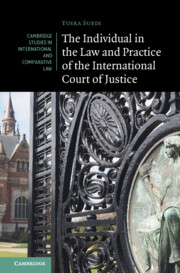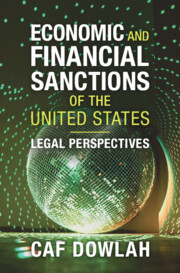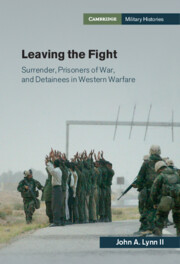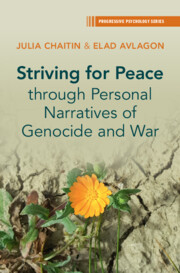52116 results in International relations and international organisations
En búsqueda del presente: Extractivismo y lenguaje en Los pasos perdidos de Alejo Carpentier
-
- Journal:
- Latin American Research Review ,
- Published online by Cambridge University Press:
- 28 March 2025, pp. 1-16
-
- Article
-
- You have access
- Open access
- HTML
- Export citation

The Individual in the Law and Practice of the International Court of Justice
-
- Published online:
- 25 March 2025
- Print publication:
- 08 May 2025

Economic and Financial Sanctions of the United States
- Legal Perspectives
-
- Published online:
- 22 March 2025
- Print publication:
- 13 February 2025

The Struggle to Reshape the Middle East in the Twenty-First Century
-
- Published by:
- Edinburgh University Press
- Published online:
- 15 March 2025
- Print publication:
- 31 May 2023
Fortuyn versus Wilders versus Baudet: the evolution of populist radical right party organization in the Netherlands
-
- Journal:
- European Political Science Review , First View
- Published online by Cambridge University Press:
- 13 March 2025, pp. 1-17
-
- Article
-
- You have access
- Open access
- HTML
- Export citation

Turkish-Greek Relations
- Foreign Policy in a Securitisation Framework
-
- Published by:
- Edinburgh University Press
- Published online:
- 08 March 2025
- Print publication:
- 01 June 2023
The Right and the Politics of Labor Informality Enforcement
-
- Journal:
- Latin American Politics and Society , FirstView
- Published online by Cambridge University Press:
- 07 March 2025, pp. 1-18
-
- Article
-
- You have access
- Open access
- HTML
- Export citation
Legislative Turnover in Latin America: Introducing a New Dataset and Analyzing Its Temporal Dynamics
-
- Journal:
- Latin American Politics and Society , FirstView
- Published online by Cambridge University Press:
- 07 March 2025, pp. 1-16
-
- Article
-
- You have access
- Open access
- HTML
- Export citation
The Ambivalent Relationship between South America and the Liberal International Order: Regional Counter-institutionalization in the Fields of Migration and Election Monitoring
-
- Journal:
- Latin American Politics and Society , FirstView
- Published online by Cambridge University Press:
- 05 March 2025, pp. 1-24
-
- Article
-
- You have access
- Open access
- HTML
- Export citation

Social Cues
- How the Liberal Community Legitimizes Humanitarian War
-
- Published online:
- 03 March 2025
- Print publication:
- 27 March 2025
-
- Element
-
- You have access
- Open access
- HTML
- Export citation
Public responsiveness and the macro-origins of immigration opinions across Western Europe
-
- Journal:
- European Political Science Review , First View
- Published online by Cambridge University Press:
- 03 March 2025, pp. 1-18
-
- Article
-
- You have access
- Open access
- HTML
- Export citation

Leaving the Fight
- Surrender, Prisoners of War, and Detainees in Western Warfare
-
- Published online:
- 01 March 2025
- Print publication:
- 06 February 2025

Striving for Peace through Personal Narratives of Genocide and War
-
- Published online:
- 22 February 2025
- Print publication:
- 13 February 2025
4 - Norm Neglect
-
- Book:
- The Politics of International Norms
- Published online:
- 07 February 2025
- Print publication:
- 20 February 2025, pp 156-208
-
- Chapter
- Export citation
Contents
-
- Book:
- Ecoviolence Studies
- Published online:
- 13 February 2025
- Print publication:
- 20 February 2025, pp v-vi
-
- Chapter
- Export citation
Introduction
-
- Book:
- The Politics of International Norms
- Published online:
- 07 February 2025
- Print publication:
- 20 February 2025, pp 1-37
-
- Chapter
- Export citation
Preface and Acknowledgments
-
- Book:
- Ecoviolence Studies
- Published online:
- 13 February 2025
- Print publication:
- 20 February 2025, pp xvii-xviii
-
- Chapter
- Export citation
5 - Norm Recognition
-
- Book:
- The Politics of International Norms
- Published online:
- 07 February 2025
- Print publication:
- 20 February 2025, pp 209-260
-
- Chapter
- Export citation
Foreword
-
- Book:
- Ecoviolence Studies
- Published online:
- 13 February 2025
- Print publication:
- 20 February 2025, pp xiii-xvi
-
- Chapter
- Export citation
Conclusion
-
- Book:
- The Politics of International Norms
- Published online:
- 07 February 2025
- Print publication:
- 20 February 2025, pp 299-310
-
- Chapter
- Export citation

